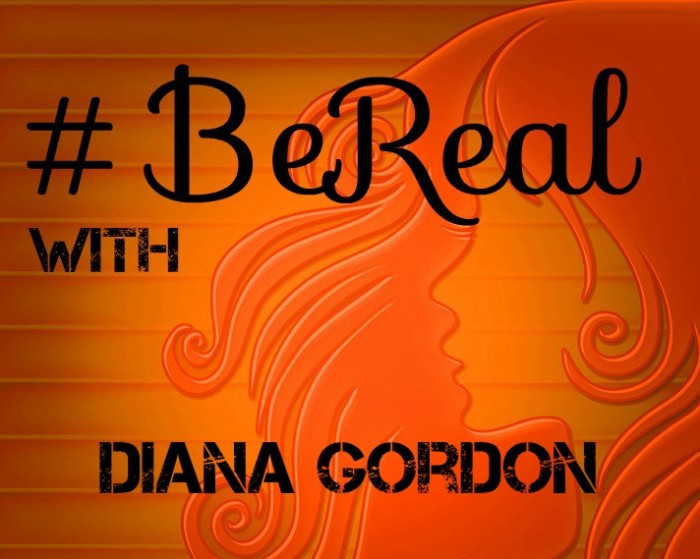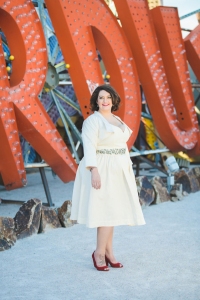My #BeReal guest today is Diana Gordon.

I’ve been asked “are they real” more times than I can count—and not just about a sparkly piece of jewelry or pieces of vintage Fiestaware, but about the curls in my hair and the breasts that have always been large-for-my-size.
The same question… As though somehow my accessories and the dishes I eat from are comparable to parts of my body. As though this question isn’t invasive, isn’t somehow indicative of a value judgement, a line between what is “authentic” and what is “fake.”
But how much would it really matter if my DDD cups were implants? How much would it matter if the curls in my hair were permed or painstakingly created with a curling iron every morning? And why? Would my “self” somehow be other than what it is if my body were modified? It can’t be. Couldn’t be. My body has been modified numerous times–tattoos and a few piercings and *lots* of hair dye over the years.
Ah, but the person asking the question would perceive me differently, even if only in a small way. Their perception would adjust to suit the new truth they had acquired. There would be, in a sense, a new “real.”
*****
“For real?”
A question often used as an exclamation. With it, we are constantly questioning one another and everyone around us. As though we can somehow discern a difference between real and unreal. As though we’re so accustomed to things that aren’t real, or at least the likelihood of things that are not real, that we always need confirmation of actualities. We must be doubly sure.
Because these days, the “real” and “not real” look remarkably alike. In the age of technology and mass production, we have all kinds of anxiety about authenticity.
Some of us remember when the technology we have now was only existent in science fiction. Many of us spend exorbitant amounts of our time on the Internet, talking to one another via reading and writing rather than in-person or face-to-face, sparking lots of arguments about what constitutes real communication. The abundance of technology makes it easier than ever to be an author, calling into question the definition of the word “publish” itself and an abundance of questions about ownership and audience.
And so one of the ways that we have these conversations is by mapping them onto our bodies. Fiction has begun to pick up on this and exaggerate it–books like Scott Westerfield’s Uglies and Marissa Meyer’s Lunar Chronicles series reflect growing tensions about how technology, the body, and authenticity. In the Uglies series, Tally Youngblood is forced to choose between becoming a renegade or undergoing a surgery that would make her perfect, aesthetically speaking, but would also make her easy to control. In The Lunar Chronicles, the cyborg citizens of the nations have virtually no rights due to a former uprising—and the citizens of Luna are able to manipulate humans to do whatever they want them to, including glamouring themselves to be more beautiful; their queen goes so far as to disallow video cameras and mirrors to avoid her real image.
*****
“Real” is one of those words. You know the ones. They’re tricksy and complex, maddeningly full of themselves despite being monosyllabic. “Real” is a four-letter word–and you know what they say about four letter-words.
 Diana is a nerd, a bookworm, a feminist, and a social media junkie. She is a freelance writer and researcher and the administrator of the blog Part Time Monster. You can follow her on Twitter @parttimemonster or find her on Facebook at facebook.com/parttimemonster. She lives in New Orleans with her son, her husband, and one very energetic terrier.
Diana is a nerd, a bookworm, a feminist, and a social media junkie. She is a freelance writer and researcher and the administrator of the blog Part Time Monster. You can follow her on Twitter @parttimemonster or find her on Facebook at facebook.com/parttimemonster. She lives in New Orleans with her son, her husband, and one very energetic terrier.



Great post. I believe in an illusory world where everything is created by our own conscious reality, real or fake is just a concept of ones own attachment to judgement and inability to just derive happiness from being. Whether something about a person is judged as real or fake is futile it is about showing kindness love and compassion to them that should be our overriding philosophy and accepting them as the amazing human being that they are.
LikeLiked by 2 people
Thank you!
I think that our lines between real and fake are almost always more fragile than we would like to believe.
LikeLiked by 1 person
Being real can be scary for some people. It means being vulnerable to other people’s judgements – and being real can simply mean “admitting” to something “not real” like the color of your hair. I’m 33 – if I let my natural hair take over, I’d have more grey hair than Betty White! I’m not up for being real just yet with that 😛
I am learning to own my vulnerabilities though! Like the fact that I have a mom gut that won’t shag off because my muscles are split apart and I can’t properly exercise them (and for the first time yesterday, I showed people what that looks like). It’s a process -to love yourself enough to be comfortable, even with your own flaws. People aren’t nearly as judgmental with us as we are with ourselves!
Great post! Thanks for sharing!
LikeLiked by 3 people
I would love for you to write one for me. If interested email me. Hastywords@gmail.com
LikeLiked by 1 person
I do think that it can be difficult to be vulnerable to others’ judgments—and that makes it a challenge to reveal something about yourself that you know other people might judge. But we also seem to make judgments about people based on what we can see to be “fake”—fake breasts are a really good example, because women who get implants are often judged pretty harshly by other people.
LikeLiked by 2 people
It would be so lovely if people didn’t judge others, weren’t as hard on themselves, and everyone just tried to compliment people instead of criticize.
LikeLiked by 2 people
It would be.
LikeLiked by 2 people
I’m reminded of that Twilight Zone episode in which efforts to cure a woman of her horrible deformity with surgery fails and we see the “normal” doctors and nurses are, by our standards, grotesquely ugly and she is beautiful. Then, there is “How Real Is Real” by Paul Watzlawick, which is rather more scholarly. And, the huge confusion so many people obviously have about whether transgendered people are “really” men or women. Perhaps reality is overrated. As far as how people decorate and modify their bodies, we have been doing that in myriad creative, and occasionally bizarre, ways for many thousands of years with no inclination to stop in the foreseeable future. We are increasingly wise to ask of images, “Is it Photo-shopped?” Much as we may enjoy playing with reality and illusion, a real sense of un-reality does make us deeply uncomfortable. Still, it is also intrusive and potentially dis-validating to be questioned about ones presentation of self. Thanks for a great post, Dianna and Hasty. reblogging
LikeLiked by 1 person
Thank you for the reblog and your thoughtful comment! I’m going to have to go and look up both the Watzlawick story and the Twilight Zone episode.
I’m also reminded of Freud and the uncanny as we talk about some of these things, especially the sense of unease and discomfort we have when we can’t tell if something is real or not real.
LikeLiked by 1 person
Yes, there has been a lot of talk recently in the field of robotics and AI about the Uncanny Valley, the zone in which a robot or AI is too close to human-like for comfort, but not quite enough to be accepted. The Watzlawick is a book. He was one of the founders of The Mental Research Institute in Palo Alto, CA. he was (I haven’t kept track, but he has probably passed on by now) also a very wise and gentle man.
LikeLiked by 1 person
Oh, that sounds interesting—I’l have to check out the Watzlawick.
Was just reading a book that delved into the Uncanny Valley a bit, some speculative fiction from Charlie Jane Anders—All the Pretty Birds.
LikeLiked by 1 person
Reblogged this on cabbagesandkings524 and commented:
Reality – what a concept!
LikeLiked by 1 person
Quotable:”Because these days, the “real” and “not real” look remarkably alike. In the age of technology and mass production, we have all kinds of anxiety about authenticity.” Brilliant summary!
LikeLiked by 2 people
Thank you!! There are few things more gratifying to hear in a comments section than that a piece is quotable. 🙂
LikeLiked by 2 people
This blog earned a Bean Pat as blog pick of the day. Check it out at: http://patbean.wordpress.com
LikeLiked by 2 people
Thank you!
LikeLiked by 1 person
Reblogged this on RoseFReblogs.
LikeLiked by 1 person
Thanks for the reblog, Rose. 🙂
LikeLiked by 1 person
Wow, I really love this Diana, *especially* very much your last bit, about real being a complex, tricksy word which is full of itself. What wonderful characterisation. I felt quite challenged by the comments on how much time we (I) spend online, and the quality of interaction which can be had here. It’s all very real, but the REAL real, as in, In Real and face to face is still fundamental to the building of a solid relationship with anyone, I think.
Thank goodness in these days of fast technology, we can also travel easily!
LikeLiked by 1 person
I do think that lots of amazing, fulfilling relationships are made possibly by technology. And it’s funny, because sometimes I think that I communicate so much better online than in-person, and then I have to stop myself and count the ways that isn’t necessarily true.
LikeLiked by 1 person
LOL there’s that aspect, too. I think online we have more time to think – more time while the communication goes from brain to fingertips then back through eyes to brain as we read what we’ve written, and decide whether or not it’s suitable. In Real, we act once, and it’s done.
LikeLiked by 1 person
Diana, What is REAL. I really don’t think the World or the USA knows any more. Thank you for your article.
LikeLiked by 1 person
Pingback: #WeekendCoffeeShare: 4/23/16 – Part Time Monster